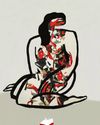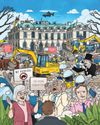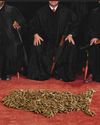
During his time in the White House, no target provoked as much anger from Donald Trump as the American press. In 2017, he declared, "The press, honestly, is out of control." In 2019, he called it "truly the enemy of the people." His reelection campaign sued the Washington Post and the New York Times. Some 500 of Trump's tweets attacked individual journalists by name, and at one point he accused the Times of "treason." When Trump and Vladimir Putin-under whose rule some critical journalists have been assassinated-sat down for a press conference at a Group of 20 summit, Trump pointed to the reporters waiting in front of them and joked, "Get rid of them."
A century earlier, an American administration did get rid of opposition journalism with a ruthlessness Trump would be fiercely jealous of. It closed down about 75 newspapers and magazines, prevented the distribution of specific issues of many more, and put journalists on trial in federal courts. This entire operation was managed from the landmark Washington building that would become, 100 years later, the Trump International Hotel.
Ironically, this wave of repression took place under a president who, on the surface, appeared to be the polar opposite of Trump. Before entering politics, Woodrow Wilson was known as an intellectual: a longtime college professor and the president of Princeton University. But when in April 1917 the United States declared war on Germany, joining the bloody conflict that had ravaged Europe for nearly three years, both the United States and its president revealed a ferocity that few people had anticipated.
この記事は Mother Jones の September/October 2022 版に掲載されています。
7 日間の Magzter GOLD 無料トライアルを開始して、何千もの厳選されたプレミアム ストーリー、9,000 以上の雑誌や新聞にアクセスしてください。
すでに購読者です ? サインイン
この記事は Mother Jones の September/October 2022 版に掲載されています。
7 日間の Magzter GOLD 無料トライアルを開始して、何千もの厳選されたプレミアム ストーリー、9,000 以上の雑誌や新聞にアクセスしてください。
すでに購読者です? サインイン

HOG WILD
The scandalous reason meat prices have skyrocketed

ALL WALKS
Limiting cars in cities can help disabled people, too.

REMIGRATION
How Trumpism is following the far right in Europe toward mass expulsion of immigrants

SETTLING THE SCORE
A pop psychology book is considered the definitive trauma text. But what if it's leading survivors down the wrong path?

Positive Spin
People with e-bikes drive less, pollute less, parkinglots-and that's only part of why cities and states are embracing them with gusto.

Cradle and All
The devastating cost of Utah's thriving adoption industry

THE BILLIONAIRE WHO NEARLY BROKE NEWPORT
TRUMP MEGADONOR STEPHEN SCHWARZMAN'S EXTREME MANSION MAKEOVER IS DRIVING HIS NEIGHBORS NUTS.

THE SECRET PLAN TO STRIKE DOWN US GUN LAWS
AND THE COP-TURNED-PASTOR AT THE CENTER OF IT ALL

GOOD NIGHT AND GOOD LUCK
Election Day inside a bustling broadcast newsroom that no longer exists

MASTER OF DISASTER
Trump won’t confront the climate crisis. He’ll feast off it.